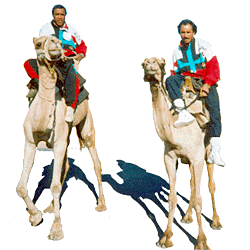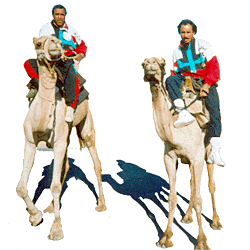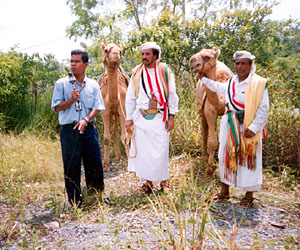
al-Qasemi & al-Qadhi: Ambassadors of Yemen on Camels [Archives:2001/06/Culture]
February 5 2001

They are two Yemeni birds of passage obsessed by a quest for traveling. They have traveled to many Arab countries using camels and horses with a message to convey Peace and Justice among Nations. In all the Arab and other foreign countries they have always raised the Yemeni flag up, marking the presence of Yemen and its people. Even in the Sydney Olympic, where there was no representatives from Yemen, these two travelers were there on their camels asserting that Yemen is there. All the obstacles, whether that of nature, climate, man, animal or language, have never refrained them from satiating their thirst and love for traveling. They have obtained many medals and certificates, the most outstanding of which are Arab Ambassadors on Camels from Presidents al-Bashir, al-Qathafi, Mubarak, and the Malaysian President. They also obtained the Malaysian Youths Ministers medal, a janbiah and sword, considered to be the most expensive medal all over the world. They also received more than 44 cups within Yemen, more than 70 cups in the Arab countries and the south east of Asia, besides the gold, silver, and bronze medals. Ali Mohammed Hunaish met with the two messengers of peace and conducted the following interview:
Q: When and how did your first trip on camels begin?
A: We started the first trip on camels on 1st September 1994 traveling in the Arab world. Our message and motto at the time was For a Single Arab Homeland. We had an official farewell from the Ministry of Youth and Sports when we traveled to Saadah and then to Saudi Arabia in an effort to revive the ancient Yemeni trade.

A: The aim was to convey the message of Yemeni Unity to the Arab people and to enhance ties and bonds of solidarity among the Arabs. Our trips are self-motivated. They came after long consideration lasting for years. The trip received a meagre support amounting to $5000, hardly enough to cover the basic needs of food and clothes.
Q: What was the route of your first trip?
A: It was through Yemen, Eritrea, Sudan, Egypt, Libya, Algeria, Morocco, Lebanon, Syria, Iraq, Jordan, Saudi Arabia, Bahrain, Qatar, UAE, and Oman.
Q: How long did the first trip take and what was the distance and outcome?
A: The first trip took 366 days, a whole year. The distance was 16,000km. The first trip was actually a rip-roaring success. We had been greatly welcomed in many Arab countries by kings, presidents, Youth and Sports Ministers and by the secretary general of the Arab League Dr. Esmat abdul Majeed.
There has also been an overwhelming reception from the Arab media and international organizations and commissions. We are really proud to prepare a book containing all that we experienced. We have taken 4000 pictures during the trip. We are thankful to the president who gave orders to the Moral Guidance Authority to print and distribute the book. However, officials there gave these orders the cold shoulder and so far the book has not seen light of day.
Q: Why did you choose camels in particular and not any other means of transportation?
A: Camels are considered to be among the best creatures of God on earth. They are the most reliable friends and companions. They are patient, kind and courageous. No wild animal attacks you while you are in the company of camels. Above all, they have extraordinary power to bear thirst and the difficulties of the desert.
Q: What common characteristics brought al-Qasemi and al-Qadhi together in this field?
A: We are actually very close to each other. We first met as athletes. Then, the bond of friendship became stronger and we became very close, intimate friends.
Q: What about your second trip? and what was the distance?
A: It was from 25.11.1999 under the motto of the holy Quraan Ive come to you from Saba (sheba) with true news., lasting for ten months. The route of the trip was through the countries of the east of Asia starting from Saudi Arabia, Kuwait, Iran, Pakistan, India, Bangladesh, Burma, Cambodia, Thailand, Vietnam, Malaysia, Indonesia, Australia, Philippines, Taiwan, China, Korea and Japan.
The distance was 36,000 km covered in 800 days, that is, two years and two months.
Q: And why the countries of the east of Asia?
A: It was to achieve friendship and peace among the nations of the world and to be acquainted with the customs and traditions of these nations. We also held seminars and lectures on history, ancient civilization and democracy in Yemen. We should never lose sight of the fact that there is quite a good number of Yemeni communities in Indonesia, Malaysia, Thailand and Singapore.
Q: What obstacles did you come to face?
A: We came to face numerous obstacles and difficulties either natural or man made. Sometimes, we find difficulties in terms of getting access to countries. Other obstacles are polluted water, perished food, wild animals, snakes, baking heat of the sun, freezing cold, language, sickness of camels, and the non-existence of representatives for our country in some Asian countries.
Q: How do you assess the support of the Ministry of Youth and Sports?
A: The Minister of Youth and sports has always given us all sorts of promises which he never keeps. The ministry has played second fiddle and did nothing to support us. If it was not for the Yemeni communities abroad, we would have suffered tremendously and probably died, particularly in the south east of Asia.
We are grateful to the President who has always supported us and his worthy son Ahmad Abdullah Saleh.
Q: Any last word you would like to say?
A: We hope to see the President as soon as possible to inform him of our conditions and of our book that has not yet seen the light of day.
——
[archive-e:06-v:2001-y:2001-d:2001-02-05-p:./2001/iss06/culture.htm]


